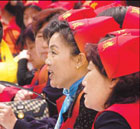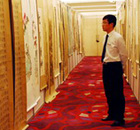Foreign and Military Affairs
'Chinese imports beneficial to EU consumers': official
(Xinhua)
Updated: 2010-05-17 10:30
 |
Large Medium Small |
| ||||
Kroes said international trade was a bit comparable to road traffic. "Most of us respect the rules of the game, but if one or two are not respecting the rules and the red lights, there will be an accident," she said.
In the case of China-EU trade relations, "most of the parties in the games are respecting the rules, and only one percent is not taking the rules into account, and that is the subject that we called anti-dumping," she said.
Recently, China-EU trade relations were marred by a dispute over imports of certain Chinese-made shoes with EU ministers voting last December to extend import duties on Chinese shoes for another 15 months.
Earlier last month, the European Commission rejected a complaint by China to the World Trade Organization that EU's anti-dumping tariffs on imports of Chinese shoes breached WTO rules.
"Making shoes is a traditional skill of my village and we are good at making shoes. I don't understand why they applied the anti-dumping measure against us, " said Gao Hua, a small-sized shoe manufacturer in Wenzhou, to the south of Ningbo of Zhejiang where the Expo forum was held.
The Federation of European Sporting Goods Industry (FESI) said in March that it had started legal action against the European Union over its decision to extend anti-dumping duties on shoes imported from China and Vietnam.
The FESI said in a statement that the European Commission's decision to extend duties on imported Chinese and Vietnamese leather footwear was based on a misguided investigation and analysis.
It was unfair to single out the one percent that didn't obey the rules, Kroes said. The 27-member EU is China's biggest trade partner. China is the EU's second-biggest trade partner and is its biggest source of imports.
China's main exports to Europe are machinery and domestic goods, including clothes and shoes. While the EU's main exports to China include industrial machinery, transport equipment, chemicals and high-end consumer goods.
"99 percent of European people are delighted to have Chinese goods and the EU's import from China is beneficial to EU consumers, and it also help keep European producers awake and competitive," Kroes said.
FESI, whose members include top sports footwear brands such as Adidas, Puma, Nike, Lacoste and Asics, said the duties had cost the industry nearly 1 billion euros ($1.36 billion) since being introduced in 2006, according to the statement.











